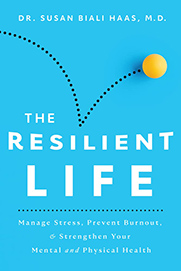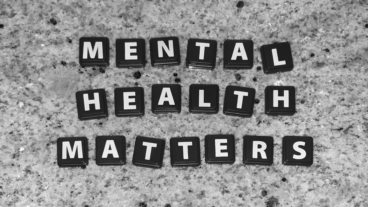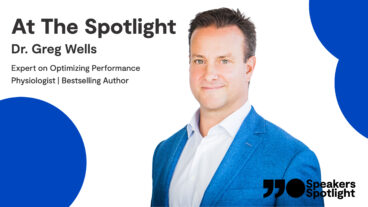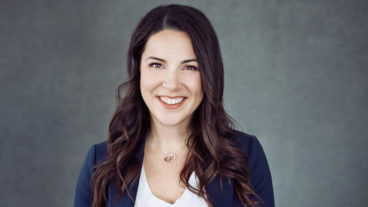Dr. Susan Biali Haas’ passion for mental health, burnout prevention, and resilience comes from a deeply personal place. Early in her award-winning medical career, Susan suffered from clinical depression and severe burnout that left her questioning not only her career in medicine but her desire to live. She has since dedicated decades of her life to helping others not end up where she did.
Today, Susan is an award-winning doctor with 20 years of primary care experience working in urban medical clinics, and an executive coach working with a broad range of clients — from military leaders and senior executives to physicians and other healthcare professionals — helping them to take control of their health and start living more impactful, meaningful lives.
This is on top of Susan’s career as an in-demand keynote speaker whose long list of speaking clients includes the US Navy, Google, the Massachusetts Institute of Technology (MIT), McKinsey & Company, The Coca-Cola Company, and Deloitte.
Becoming Whole Again: Healing from Burnout
This is a life Susan didn’t think possible in year two of her emergency medicine training program. She had just gotten home after finishing a 36-hour shift in the ER cardiac care unit at a large trauma hospital. Exhausted, she had barely shut the door before she dropped her things, laid down on the floor in the dark, and started crying.
Susan was questioning everything — she didn’t know how she could last the week, let alone the years left in her program and the decades ahead as an emergency physician. Should she quit the program? Medicine? The planet?
Just as her thoughts were taking a dark turn, the phone rang. It was her chief emergency medicine resident, Karen, calling to check in; she was worried about Susan.
At first Susan tried to brush off the concern — after all, she had spent years crafting a façade of perfection. But Karen was calling Susan because a resident had previously died by suicide during the very same rotation Susan was currently in. Karen asked her one more time, are you ok?
The floodgates opened and for the first time, Susan shared how she was actually feeling. And to her surprise, it felt good. She felt that in some remarkable way her life was being put back together — she was being put back together.
Susan took a stress leave with Karen’s assurance that if she wanted to return to the program, she would be there for her and provide whatever support she needed. But Karen wanted Susan to use this time to reflect on who she really was, what talents and gifts she wanted to use in this world, and what she actually wanted her life to be like.
After her stress leave, Susan quit the ER program. While completing Karen’s homework during her time off, she realized that the ER simply wasn’t a career fit. Beyond the extreme intensity of the environment, Susan didn’t fit the personality profile of an emergency room doctor. She jokes about it today, saying that she is the last person you would want around in an ER because she panics under pressure and gets lightheaded at the sight of copious amounts of blood.
Switching Gears: Finding Purpose
Susan got her license to practice medicine in the community, and embarked on an incredible adventure that she never thought possible, especially during that darkest of moments, lying on the floor of her apartment.
From that day forward, Susan dedicated herself to learning everything she could about whole picture mental health and resiliency. At first, her goal was to protect herself from ever being that mentally unwell again. Yet the more she learned, the more she knew she had found her purpose — she wanted to help others the way Karen had helped her; she wanted to help others heal from burnout and find their meaningful life too.
The Resilient Life: How Purpose Heals

Throughout her research and work, Susan was always fascinated with the role purpose plays in our lives. She explores its crucial role in her book, The Resilient Life: Manage Stress, Reduce Burnout, and Strengthen Your Mental and Physical Health.
When cultivated, purpose can proactively prevent burnout and improve our general well-being. Here’s how:
People who feel a strong sense of purpose are more likely choose healthy behaviours.
One compelling study found that people with a higher purpose are more proactive in taking care of their health. They were more likely to use preventive health care services. Each unit increase in purpose was associated with 17% fewer nights spent in hospital.
Purpose and meaning can lengthen your life.
A 2019 study by the University of Michigan School of Public Health looked at the association between life purpose and mortality. They found that people without a strong life purpose were more than twice as likely to die than those that did.
This surprising pattern was found consistently across the test group, independent of people’s financial circumstances, gender, race, or education level.
A sense of meaning can prevent burnout.
Polish health psychologist Dariusz Krok conducted a study examining the relationship between meaning in life and burnout for firefighters. His study found that firefighters with higher levels of personal meaning reported less emotional exhaustion and depersonalization, and more personal accomplishment (these are the primary symptoms of burnout).
Based on this study, Krok released a powerful statement that said “individuals who experience meaning in life and pursue significant life goals in such domains as personal achievement and engagement, relationships with others, self-acceptance, and justice in the world are characterized by less feelings of being emotionally exhausted by one’s work, impersonal and detached responses to various aspects of the job, and also by more feelings of personal accomplishment, competence, and efficiency at work.”
How to Find Your Purpose
If you, like many others today, feel frustrated by a lack of purpose or meaning in your life, Susan shared a tool to help you connect more with your purpose.
It’s called The Personal Meaning Profile (PMP) and was created by Paul T.P. Wong, Ph.D., a Canadian clinical psychologist, researcher, and professor. It helps to measure people’s perception of personal meaning in their life.
Wong’s PMP consists of a series of 57 statements that point to where an individual might derive meaning in life. There are seven general categories that he has identified as sources of meaning:
- Achievement (e.g., I engage in creative work”)
- Relationship (e.g., “I relate well to others”)
- Religion (e.g., “I believe that life has an ultimate purpose and meaning”)
- Self-transcendence (e.g., “I strive to make this world a better place”)
- Self-acceptance (e.g., “I accept my limitations”)
- Intimacy (e.g., “I have a good family life”)
- Fair treatment or perceived justice (e.g., “I am treated fairly by others”
While reading the list of seven general categories, ask yourself, which of them stand out to you the most? If you have a journal, Susan recommends that you write down some thoughts related to that category, such as:
- Why does it mean so much to you?
- How is it part of your life right now?
- If it’s not something you’ve been intentionally focusing on, how could you connect more to this particular aspect of your life?
- How you can you deepen your connection to this important source of meaning?
This can start providing some clarity into what brings you fulfillment in life. Well-being, Susan says, begins by knowing what matters to you and doing what matters to you — and this is the foundation of a sustainable, satisfying life that has an impact. Susan should know, she’s been there.
An award-winning medical doctor, Dr. Susan Biali Haas’ life passion is to equip people with the knowledge, skills, and tools that will help them to enjoy optimal mental health, avoid burnout, and increase their resilience.
Contact us to learn more about Susan and how she’s helping leaders and their teams fortify their minds, bodies, lives, and workplaces as we face today’s unprecedented challenges.




